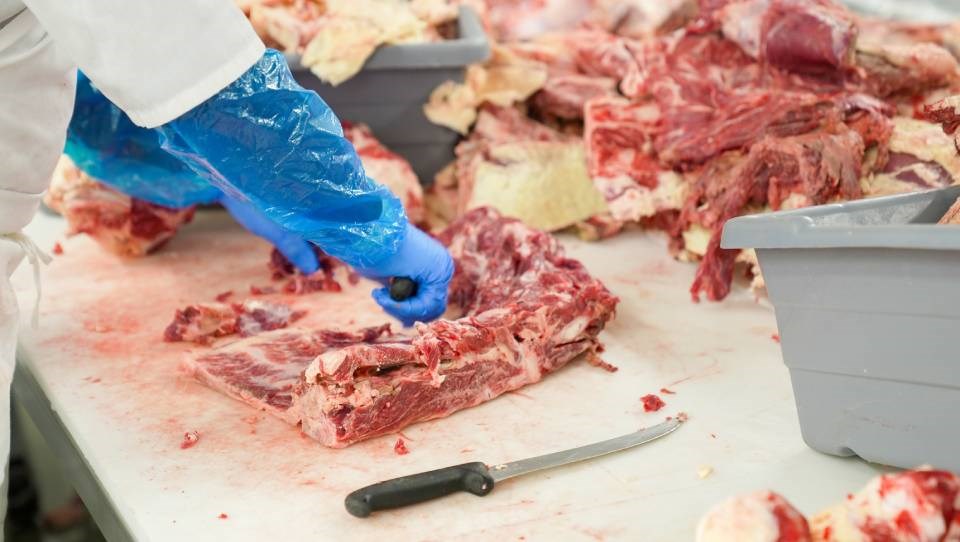Canadore College is creating a new microcredential program to train meat cutters, a response to local need that could also help alleviate industry shortages across the province.
Meat Processing Fundamentals, currently under development at the North Bay college, is a hybrid online/in-person certificate program that will train students in butchering techniques to prepare them for work in abattoirs, grocery stores, restaurants, and butcher shops.
Students will complete 284 hours of training in everything from meat processing to quality assurance to sanitation and safety, following which students will be required to complete a two-week placement with an employer of their choice.
The program is primarily aimed at prospective students in Northern Ontario, but Jeff Wilson, a program leader in Canadore’s Continuing Education division, believes it could have a more universal appeal.
Other meat-cutting programs are available in Ontario: the Seaway Valley Meat Cutting Institute in Cornwall offers 540 hours of comprehensive training toward a meat-cutting apprenticeship, while the one-year Professional Butchery Techniques program at Fanshawe College in London also requires students to learn a background in business fundamentals.
But Wilson believes Canadore’s is the only program to offer the hybrid model, a flexible and contemporary approach to learning that might appeal to a wide range of potential trainees.
“We look at local need whenever we do these types of things, and I think there’s certainly a need for it in Northern Ontario,” Wilson said.
“I hope that by delivering it in the method that we are, being a hybrid delivery where the theory portion is online, that makes it successful and we can reach a broader region.”
According to the industry organization Meat & Poultry Ontario, there’s currently an estimated shortage of 2,400 meat cutters in Ontario.
There have also been industry calls for government support to increase the number of abattoirs and meat cutters across the province to address a growing interest in local food.
In preparation for the launch of its halal meat-processing facility in North Bay, which became operational last March, Ukraine-headquartered Canada Meat Group said it eventually planned to source its meats from Northern Ontario farmers, and would build its own abattoir to handle the product.
“It’s very important for us to construct also a slaughtering facility,” said Oleskandr Zahrebelnyi, president of Canada Meat Group, during the 2020 Northern Ontario Ag Conference held in Sudbury. “It’s not so cheap, it’s not so easy for regulations, but it’s our goal.”
Canadore plans to offer Meat Processing Fundamentals as an asynchronous program, meaning the courses are pre-packaged and students can do the week’s work at their own pace, Wilson noted. So, students could still work full time and study in their off hours.
Once the coursework is finished, the students will need to find an employer that will take them on for their placement so they can learn the hands-on aspects of the trade.
“There’s a lot of specialized equipment that needs to be used to teach people the skills that are within this certificate; something as simple as meat hooks,” Wilson said.
“You’re talking about the whole cow and you’ve got this big meat hook that’s on rails that goes across the ceiling. Things like that don’t exist at Canadore.”
Banking on the growing interest in food and food systems, the North Bay college is simultaneously developing two additional programs: the Everyday Meat Cutting course and the Process Operator-Food Manufacturing Apprentice.
The latter is geared toward anyone working in the food industry, from butchers to microbrewers, who wants a foundation in food processing, while the Everyday Meat Cutting course will interest people like home cooks and foodies who have a keen interest in what’s involved in preparing their own cuts.
“It’s for your average person who’s interested in processing different kinds of meat,” Wilson said of the general interest course.
Development of all three programs has been somewhat delayed due to challenges posed by the pandemic, he noted, but work is starting to get back on track.
A subject matter expert from Sudbury who works in the industry has been retained to help develop the courses for Meat Processing Fundamentals, and the first few courses should be complete by year’s end.
Development work on the remaining courses should ramp up this winter, Wilson said, and if all goes well, he anticipates the program will be complete and available for enrollment by the spring.




